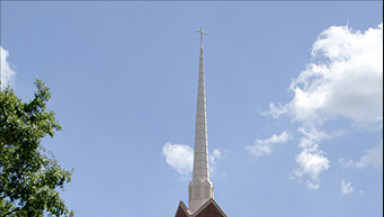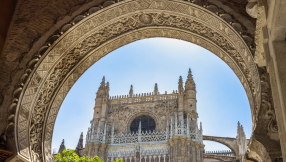
The story's told of the visiting minister who began his family talk with the question: "Now, children, what's grey, furry and lives in a tree?"
The answer from one of them – aged eight, but with the world-weary cynicism of 80 – was: "I know the answer's Jesus, but it sounds like a squirrel to me."
Whether the answer is Jesus depends on the question. But here's another: who composed the Lord's Prayer? Surely our little angel's on firmer ground here – the clue's in the name, after all?
Well, yes – and no.
The Lord's Prayer as we have it in Mark 6: 9-13 is used in churches all over the world, usually with the ancient addition: "For thine is the kingdom, and the power, and the glory, for ever and ever, Amen." It's in the Sermon on the Mount, and as Matthew tells it comes as part of Jesus' teaching to his disciples on prayer. In Luke 11: 2-4 most of it is there again, this time in response to a request from the disciples that Jesus "teach us to pray".
But are they as unique as they seem? Here's a different version.

"Our Father, who is in heaven. Hallowed be your exalted name in the world which you created according to your will. May your kingdom and your lordship come speedily, and be acknowledged by all the world, that your name may be praised in all eternity.
"May your will be done in heaven, and also on earth, give tranquillity of spirit to those that fear you, yet in all things do what seems good to you. Let us enjoy the bread daily apportioned to us.
"Forgive us, our father, for we have sinned; forgive also all who have done us injury; even as we also forgive all. And lead us not into temptation, but keep us far from all evil.
"For yours is the greatness and the power and the dominion, the victory and the majesty, yes all in heaven and on earth. Yours is the kingdom, and you are lord of all beings for ever. Amen."
Sound familiar? It's taken from The Sayings of Jesus (1954) by TW Manson – though I've modernised it – and it's made up entirely of lines drawn from different contemporary Jewish sources. In other words, the thoughts and ideas – sometimes the very language – Jesus used in what we call the Lord's Prayer were common currency at the time.
So what does this mean for our understanding of the Lord's Prayer?
1. First, it shows us how deeply rooted our Christian faith is in that of our Jewish elder brothers and sisters. Even the words we use Sunday by Sunday are words which they were, and are, familiar with from their own tradition. After centuries of shameful anti-Semitism, Christians can't be reminded too often that Jesus was Jewish.
2. Second, it should make us look even harder at what Jesus said. He didn't spin the Lord's Prayer out of his own head. He drew on all the treasury of Jewish spiritual thought and distilled it into a few lines that summed up what he wanted it to say. Manson puts it like this: "It may be said that the teaching of Jesus on the fatherhood of God is summarised in the Lord's Prayer."
3. Third, it should teach us humility. Our belief in the uniqueness of Christ and the fullness of God's revelation in him can lead us to assume that other faiths have nothing to give, and that God has never spoken in them. We have a special relationship with Judaism, but God has "not left himself without testimony" in any part of the world (Acts 14:17).
Understanding where our faith came from can only deepen it – and in the end, the Lord's Prayer is what Jesus himself gave us as a way of teaching us about the Father, and about ourselves.
Follow @RevMarkWoods on Twitter.
















